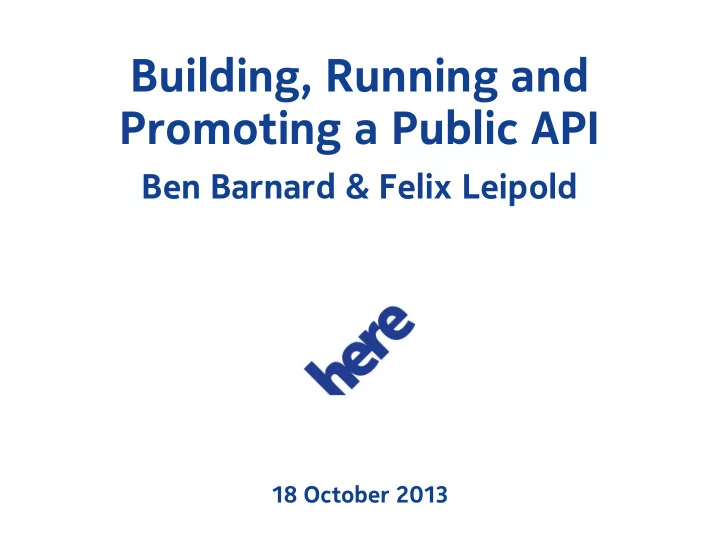

Building, Running and Promoting a Public API Ben Barnard & Felix Leipold 18 October 2013
Building Running Promoting Extensibility Design Evolution Tools for Client Devs Tools & Docs Tools for Troubleshooting Scala
Internal Commercial/ Long Tail HERE Places API Place Data
Internal Commercial/ Long Tail HERE Places API User Generated Search R ecommendations … Place Data A ddress Data Content
GET /places/v1/discover/search?at=52.5515%2C13.4039&q=restaurant&… HTTP/1.1 Host: places.demo.api.here.com Accept: application/json Accept-Language: en-US,en;q=0.5 HTTP/1.1 200 OK Cache-Control: no-store, must-revalidate Content-Language: en Content-Type: text/html; charset=UTF-8 Expires: Thu, 26 Apr 1970 20:00:00 GMT Pragma: no-cache Connection: keep-alive {"results":{"next":"http://places…","items":[ … ] }, …} // a very long line!
Browser Plugin
Content Negotiation
Tweaking the Request
Tweaking on the Console
Example Search Response
The Case for Extensibility
“Be conservative in what you do, be liberal in what you accept from others.” — RFC 793
“Be liberal in what you do, be conservative in what you accept from others.” — Felix Leipold
Backwards Compatibility
Lifetime of a Request Client Places API Dependency 1 Dependency 2 Dependency 3
Cranking up the log level Client Places API Dependency 1 Dependency 2 Dependency 3
Looking at a Particular Request Client Places API Dependency 1 Dependency 2 Dependency 3 http://places…?DEBUG
Escalating Log Level Client Places API Dependency 1 Dependency 2 Dependency 3
Returning Transaction IDs Client Places API Dependency 1 Dependency 2 Dependency 3 generateTID() TID TID TID TID
Scala
Collections // Given: def reverseGeocode(ids: Seq[Address]): Seq[Coordinates] = … // We can write: def fiveClosest(centre: Coordinates, places: Seq[Place]): Seq[Place] = reverseGeocode(places.map(_.address)) .zip(places) .sortBy { case (coords, place) => coords.distanceFrom(centre) } .take(5) .map(_._2)
Collections // Given: List<Coordinates> reverseGeocode(List<Address> ids) { … } // We can write: List<Place> fiveClosest(Coordinates centre, List<Place> places) { List<Address> ids = new ArrayList(); for (Place place : places) ids.add(place.address()); List<Coordinates> coordinatesList = reverseGeocode(ids); final Map<Place, Double> distanceByPlace = new HashMap(); for (int i = 0; i < places.size(); i++) distanceByPlace.put(places.get(i), coordinatesList.get(i).distanceFrom(centre)); List<Place> sortedPlaces = new ArrayList(places); Collections.sort(sortedPlaces, new Comparator<Place>() { public int compare(Place a, Place b) { return Double.compare(distanceByPlace.get(a), distanceByPlace.get(b)); } }); return sortedPlaces.subList(0, 5); }
Options // Given: def fetchUserContent(id: PlaceID): Option[UserContent] = … // We can write: def augmentWithUserImages(place: Place): Place = { val userContent = fetchUserContent(place.id) val userImages: Seq[Image] = userContent .map(_.images) .getOrElse(Seq.empty) place.copy(images = place.images ++ userImages) }
Options // Given: UserContent fetchUserContent(PlaceID id) { … } // We can write: Place augmentWithUserImages(Place place) { UserContent userContent = fetchUserContent(place.getID()); if (userContent != null ) { List<Image> images = place.getImages(); images.addAll(userContent.getImages()); place.setImages(place.getImages()); } return place; }
Case Classes case class Coordinates(latitude: Double, longitude: Double) case class Location(position: Coordinates, address: Option[Address] = None) val gotoConferenceLocation = Coordinates(52.473068, 13.45878)) val gotoLocationWithAddress = gotoConferenceLocation.copy( address = Address(street = Some("Sonnenallee"), house = Some("225"), city = Some("Berlin"))
Futures Eventual result of an asynchronous operation val responseFuture: Future[Response] = Future { client.makeSyncCall(request) }
// Given: def renderResponse(place: Place): Response = … def buildPlace(metadata: Metadata, images: Seq[Image], reviews: Seq[Review]): Place = … // We can write: val futureMetadata: Future[Metadata] = … val futureImages: Future[Seq[Image]] = … val futureReviews: Future[Seq[Review]] = … val place: Future[Place] = for { metadata <- futureMetadata images <- futureImages reviews <- futureReviews } yield buildPlace(metadata, images, reviews) val response: Future[Response] = place.map(renderResponse) corePlace placeID place images reviews
Lessons Learnt API development is different from app development Make it easy to play around and explore Make it easy to troubleshoot problems Be strict with what you accept Use production activity to drive meaningful tests Treat documentation as a first-class concern
Use it curl -s \ --data-urlencode "cat=eat-drink" \ --data-urlencode "in=52.5304,13.3864;r=640" \ --data-urlencode "size=15" \ --data-urlencode "pretty" \ --data-urlencode "app_code=NYKC67ShPhQwqaydGIW4yg" \ --data-urlencode "app_id=demo_qCG24t50dHOwrLQ" \ --get 'http://places.demo.api.here.com/places/v1/discover/explore' \ | jsed --raw 'function(r) r.results.items.map(function(i) i.title + " (distance " + i.distance.toString() + "m)" ).join("\n")' \ | rl -c 1
Questions? https://places.demo.api.here.com ben.barnard@here.com felix.leipold@here.com
Recommend
More recommend